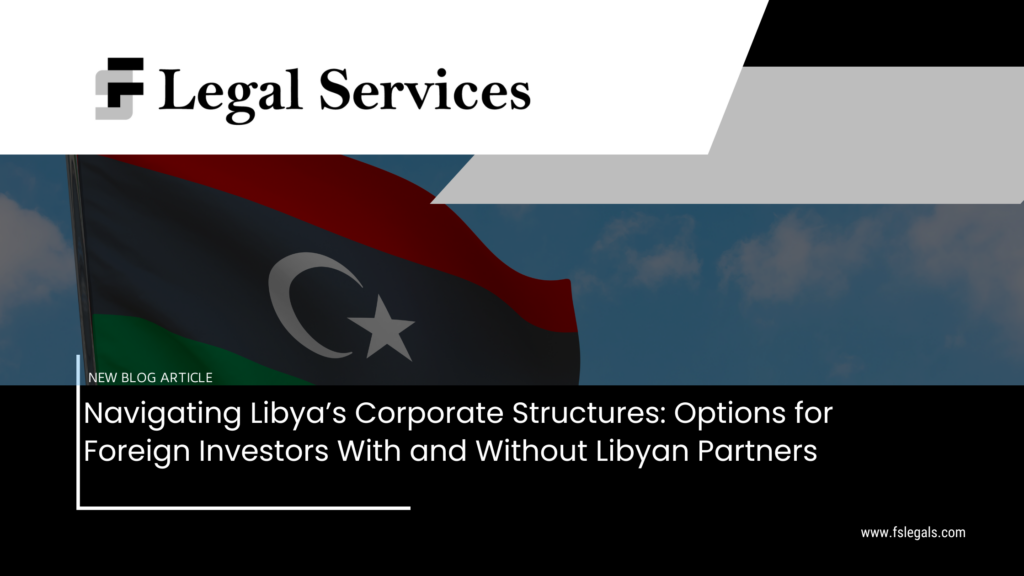Navigating Libya’s Corporate Structures: Options for Foreign Investors With and Without Libyan Partners

Introduction
In our previous article, we examined Libya’s Investment Law (Law No. 9 of 2010), which provides generous incentives to foreign investors. This guide builds upon that legal foundation by exploring the practical process of setting up a business in Libya, focusing on the entities defined under the Libyan Commercial Code (Law No. 23 of 2010) and Decree No. 207 of 2012.
We categorize entity types based on whether or not a Libyan partner is required, and explain the compliance, documentation, and strategic considerations involved in each structure.
Entities Requiring a Libyan Partner
Some corporate forms in Libya mandate that foreign investors partner with Libyan nationals or entities. The most common structures under this category are:
1. Joint Stock Companies (JSCs)
- Ideal for: Large-scale or sector-specific investments
- Ownership cap: 49% (extendable to 60% with Ministry approval)
- Minimum Capital: 1,000,000 LYD or 30% of subscribed capital
- Board Requirements: Chairperson must be a Libyan national
Documentation Required:
- Memorandum and Articles of Association of the parent company
- Commercial extract/registration certificate
- Board Resolution with company name, capital, shareholder details, and Libyan chair appointment
- Two years of audited financials
- Experience certificates
- Legalised documents via Libyan Embassy
2. Limited Liability Companies (LLCs)
- Ideal for: Small to mid-sized ventures
- Ownership cap: 49% (extendable to 60% with approval)
- Minimum Capital: 50,000 LYD
- Management Requirement: Director must be Libyan
Documentation Required:
- Company charter and resolution
- Capital details and Libyan director appointment
- Experience certificates and financial statements
- Legalisation via embassy
These options provide compliant and flexible market entry but require partnership with Libyan nationals and alignment with national policy directives.
Entities Allowing Full Foreign Ownership
For companies seeking full control and autonomy, Libya allows 100% foreign ownership under specific conditions. Two key vehicles are available:
3. Branches of Foreign Companies
- Ownership: 100% foreign
- Sector Limitation: Allowed in approved sectors (e.g. oil services, construction, telecom)
- Capital Requirement: 250,000 LYD (transferred in foreign currency)
- License Duration: Up to 5 years (renewable)
- Local Management: One of the manager/deputy roles must be held by a Libyan
Documentation Required:
- Full legal set of parent company documents
- Board Resolution detailing name, activities, capital, and appointees
- Experience certificates and financial statements
- Declaration of no existing Libyan bank accounts
- All documents notarised and legalised
Benefits: Full control and profit repatriation, suitable for sectors aligned with Libya’s development goals.
4. Representative Offices
- Purpose: Non-commercial presence
- Activities Allowed: Market research, networking, promotion only
- Commercial Restrictions: Cannot generate revenue
- Management: No Libyan manager required
Documentation Required:
- Charter and incorporation documents of the parent company
- Board Resolution authorising representation
- Financial statements and experience certificates
Benefits: Low-cost entry strategy for exploring the Libyan market before launching full operations.
5. Setting Up in the Misurata Free Zone (MFZ)
The Misurata Free Zone (MFZ) offers an attractive regime for foreign investors seeking tax advantages, full ownership, and operational freedom.
Key Benefits:
- 0% income and corporate tax
- No VAT
- 100% foreign ownership
- Customs duty exemptions
- Free repatriation of profits
- No restrictions on labour recruitment
- Access to affordable infrastructure and land
Steps to Set Up in MFZ:
- Define the business activity within the free zone
- Prepare required documents
- Submit application to MFZ Authority
- Secure approvals from relevant government bodies
- Complete free zone registration process
Documentation Required:
- Parent company’s incorporation documents
- Board Resolution
- Financial statements
- Activity-specific compliance approvals
Tax Obligations for Foreign Entities
Regardless of the structure chosen, foreign companies in Libya are subject to the following:
- Corporate Tax: 20%
- Jihad Tax: 4%
- Social Security Contributions: Employer contribution of 20.5%
- Annual Reporting: Required for tax and regulatory compliance
Conclusion
Libya offers a diverse set of business structures to suit various investment strategies — from fully owned foreign branches to joint ventures and flexible free zone setups. Each option carries specific requirements in terms of capital, compliance, and documentation.
At FS Legal Services, we provide end-to-end legal assistance for foreign investors, from choosing the appropriate entity type to handling registration, document legalisation, and compliance with Libyan law.
📩 Need help setting up your business in Libya?
Let us guide you through the legal process with confidence.